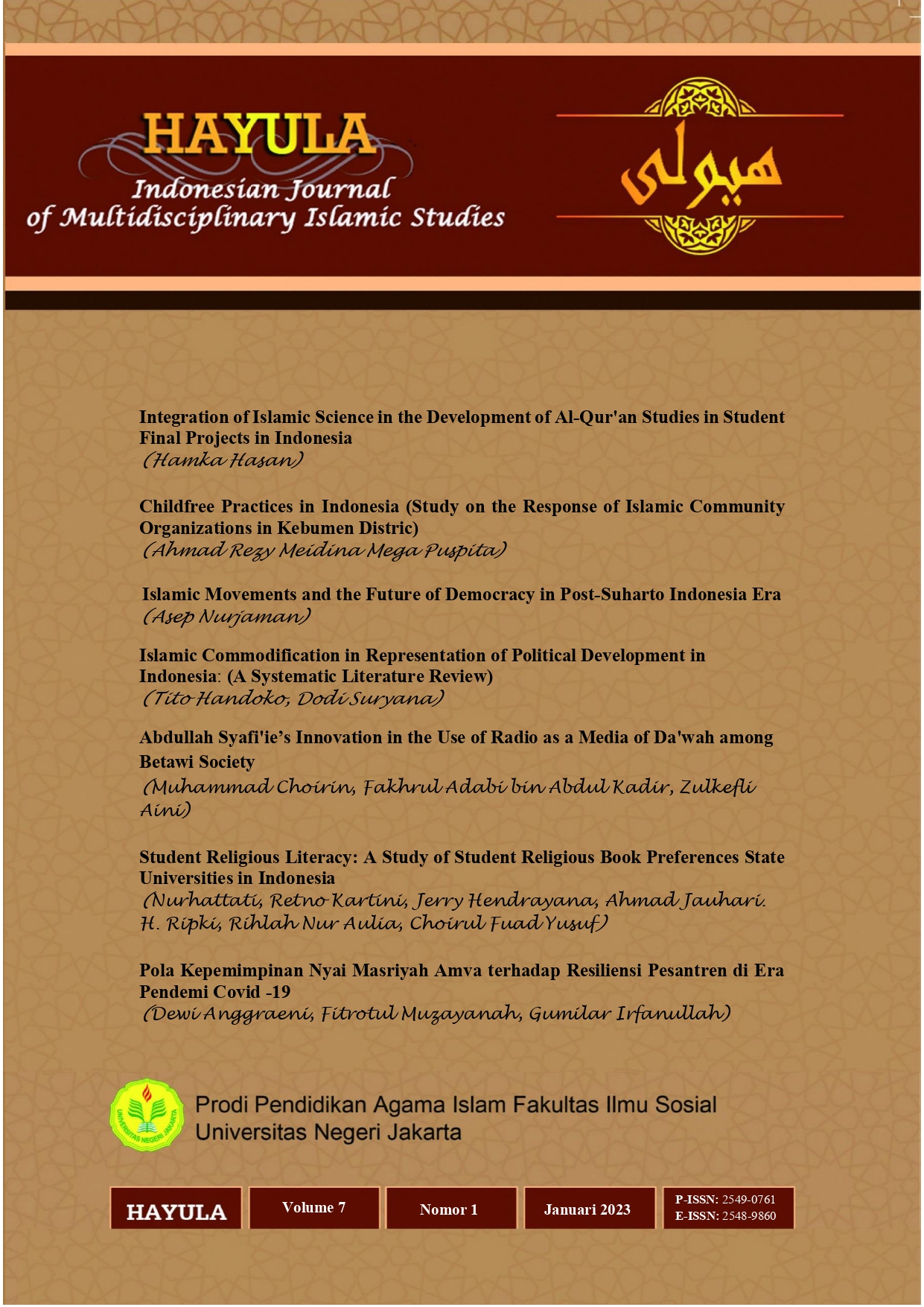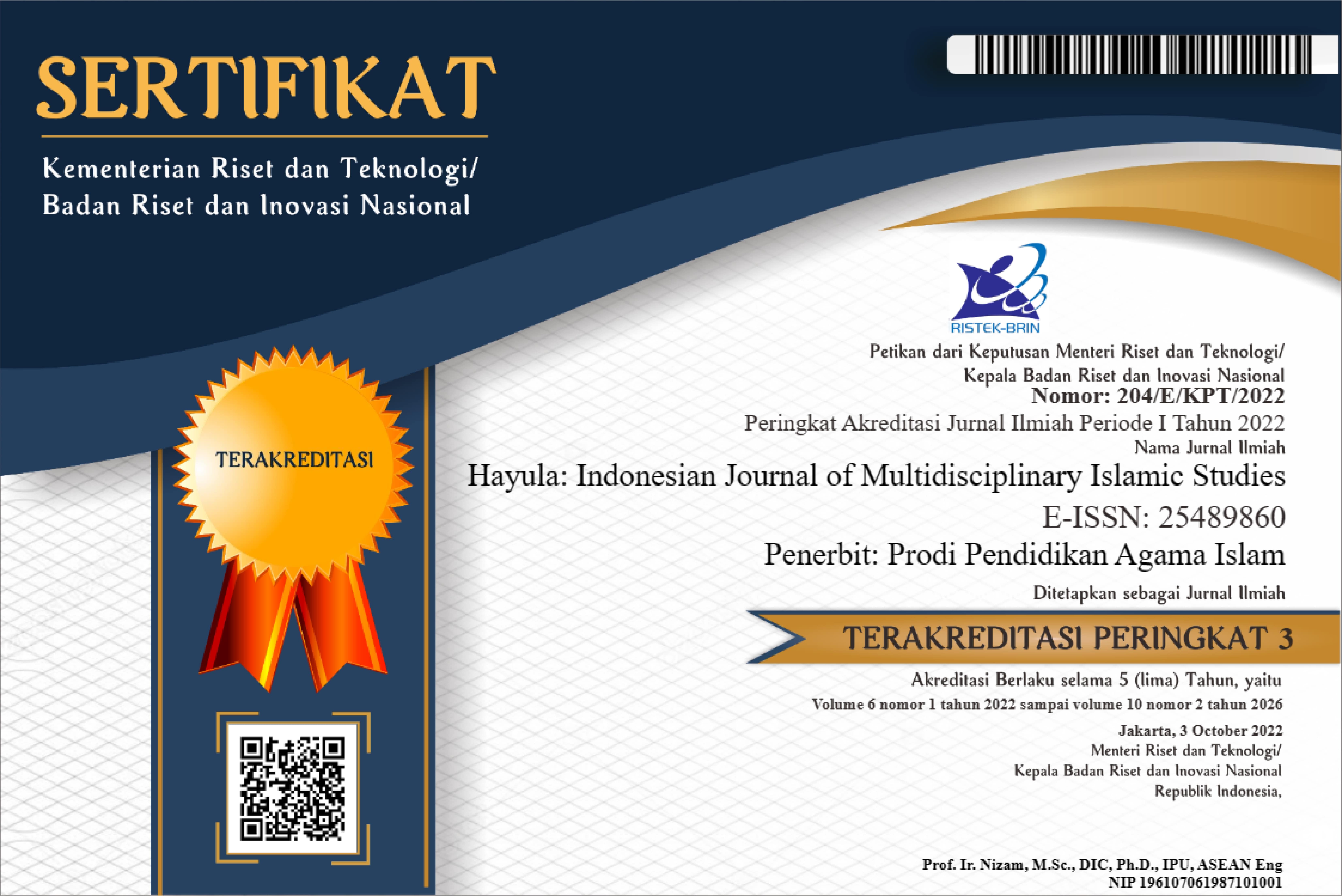Islamic Commodification in Representation of Political Development in Indonesia: A Systematic Literature Review
DOI:
https://doi.org/10.21009/hayula.007.01.04Keywords:
Comodification of Religion, Political Development, RepresentationAbstract
The phenomenon of the commodification of religion in politics does not only occur in Indonesia, but western countries have also already experienced that phase. This can be understood because of the development of western democratic life, which emphasizes individual freedom and limits the role of the state in religious activities. Likewise, with religious life in developing countries (read Indonesia), there is a notion saying that religion has even become a milestone for the establishment of the state. The unity of religious leaders, for example, is a force that can mobilize a spirit of unity and integrity. In the practice of democracy in Indonesia, the support of Indonesian Muslims for democratic values can then be considered concerning the behavior of Islamism (Muslim worship). Thus, this study critically and qualitatively examines how the commodification of Islam in the representation of political development in Indonesia from various related articles. Based on these concerns, a systematic literature review was used as a method of analyzing national and international journal articles from nine managed databases. From the literature review, there were thirty (30) relevant research-based articles in the last 10 years from 2010 to 2020 selected from Google Scholar, Taylor, Francis Outline, Springer Link, Emerald Insight, Science Direct, Sage Journal Online, and Oxford Cambridge. Three stages are carried out: preparation, data screening and validation, and content review. The findings cover: 1) the value of Islam in the representation of political development in Indonesia, 2) the form of commodification of Islam in the representation of political development in Indonesia, 3) the implications of the commodification of Islam in political development in Indonesia.
References
Abdul Jamil. (2012). Potensi Konflik dan Integrasi Kehidupan Keagamaan di Provinsi Gorontalo. Jurnal Multikultural & Multireligius, 11(3), 116–127.
Abdul Malik, A. B. (2014). Komodifikasi Agama dalam Ruang Politik di Seberang Kota Jambi Religion Commodification in Political Activities in Seberang Kota Jambi. Jurnal Kontekstualita, 29(2), 99–114.
Amna, A. (2019). Hijrah Artis Sebagai Komodifikasi Agama. Jurnal Sosiologi Reflektif, 13(2), 331–350.
Arie Setyaningrum, G. O. (2017). Politik Keshalehan Personal dalam Pemilihan Presiden 2014 dalam Media Sosial Twitter. Jurnal Pemikiran Sosiologi, 4(2), 65–87.
Arjon, S. S. (2018). Religious Sentiments In Local Politics. Jurnal Politik, 3(2), 171–198. https://doi.org/10.7454/jp.v3i2.123
Baradaran-Robison, S., Scharffs, B. G., & Sewell, E. (2015). Religious Monopolies and the Commodification of Religion. SSRN Electronic Journal, 32(4). https://doi.org/10.2139/ssrn.2609510
Bourchier, D. M. (2019). Two Decades of Ideological Contestation in Indonesia: From Democratic Cosmopolitanism to Religious Nationalism. Journal of Contemporary Asia, 49(5), 713–733. https://doi.org/10.1080/00472336.2019.1590620
Bruinessen, M. van. (1992). Tarekat Naqsyabandiyah di Indonesia: Survei Historis, Geografis dan Sosiologis. Bandung: Mizan.
Darajat, Z. (2017). Muhammadiyah dan NU: Penjaga Moderatisme Islam di Indonesia. Hayula: Indonesian Journal of Multidisciplinary Islamic Studies, 1(1), 79–94.
Dasmati. (2012). Implementasi Peran Kepemimpinan Dengan Gaya Kepemimpinan Menuju Kesuksesan Organisasi. Jurnal Academia Fisip Untad, 04(01), 783–798.
Djupe, P. A., & Lewis, A. R. (2015). Religion and Politics in the United States. In International Encyclopedia of the Social & Behavioral Sciences: Second Edition (Second Edition, Vol. 20). https://doi.org/10.1016/B978-0-08-097086-8.84011-8
Effendi, M. R., Kahmad, D., Solihin, M., & Wibisono, M. Y. (2021). Relasi Agama dan Masyarakat: Studi Tentang Interaksi Masyarakat Bandung Barat dan Jamaah Tabligh. Hayula: Indonesian Journal of Multidisciplinary Islamic Studies, 5(1), 1-24.
Eliza. (2013). Makna dan Sejarah Ajaran Zuhud Dalam Tasawuf. Al-Munir: Jurnal Ilmiah Dakwah dan Komunikasi, 4(8), 74–93.
Erawadi, A. S. (2019). Eksistensi Tarekat Naqsyabandiyah dan Peranannya dalam Pengembangan Islam di Tapanuli Bagian Selatan. Padangsidimpuan.
Everett, S. S. (2018). Interfaith Dialogue and Faith-Based Social Activism in a State of Emergency: laïcité and the Crisis of Religion in France. International Journal of Political Culture Society, 31, 437–454. https://doi.org/doi.org/10.1007/s10767-018-9291-0
Fahrurrozi Dahlan. (2015). Tuan Guru: Eksistensi dan Tantangan Peran dalam Transformasi Masyarakat (M. Firdaus, Ed.). Jakarta: Sanabil.
Hajriansyah. (2018). Kontroversi Tarekat, Mursyid dan Peran Sosial-Politiknya
Hakam, S., Pamungkas, C., & Budiwanti, E. (2017). Komodifikasi Agama -Agama di Korsel. Jurnal Kajian Wilayah, 7(2), 159–168.
Hakim, I. N. (2014). Islam Dan Demokrasi: Studi Komparatif Antara Teori Politik Islam Dan Demokrasi Barat. Jurnal Madania, XVIII(1), 43–56.
Harold, R. (2015). Agama dan Pembentukan Realitas dalam Pandangan Peter Ludwig Berger. Ejournal UKSW Universitas Kristen Sayta Wacana, 139–159.
Hasan, N. (2014). Agama dan Kekuasaan Politik Negara. Jurnal Karsa, 22(2), 298–310.
Hasse Juba, M. H. (2017a). Komodifikasi Agama Di Ruang Publik: Studi terhadap
Penggunaan Simbol Agama Pilkada 2015 di Kabupaten Kebumen Jawa Tengah.
KNAPPPTMA KE-6, (September), 49–65.
Hasse Juba, M. H. (2017b). Komodifikasi Agama Di Ruang Publik: Studi terhadap
Penggunaan Simbol Agama Pilkada 2015 di Kabupaten Kebumen Jawa Tengah.
Prosiding Konferensi Nasional Ke-6 Asosiasi Program Pascasarjana Perguruan Tinggi Muhammadiyah ‘Aisyiyah (Appptma) Jilid Ii: Sosial Dan Politik, Pemikiran Islam, Hukum, Kesehatan, (September), 49–65.
Hidayat, Z. (2019). Kuasa Kelas Bawah dan "Bisnis Berkah di Makam Wali: Narasi Kehidupan Khādim Tarekat. Tangerang Selatan: Pustakapedia.
Kapur, R. (2020). Pragmatic Muslim politics: the case of Sri Lanka Muslim Congress. Asian Ethnicity, 00(00), 1–4. https://doi.org/10.1080/14631369.2020.1763779
Lambert, F. (2017). National Elections and Religion in America. USA: Oxford Research Encylopedia of Religion.
Leonard, K. (2003). American Muslim Politics. Ethnicities, 3(2), 147–181. https://doi.org/10.1177/1468796803003002001
Malik, A., Batubara, A., Km, J. J. B., Duren, S. S., & Jambi, M. (2014). Komodifikasi Agama dalam Ruang Politik di Seberang Kota Jambi Religion Commodification in Political Activities in Seberang Kota Jambi. Kontekstualita, 29(2), 99–114.
Masuda, K., & Yudhistira, M. H. (2020). Does education secularize the Islamic population? The effect of years of schooling on religiosity, voting, and pluralism in Indonesia. World Development, 130, 104915. https://doi.org/10.1016/j.worlddev.2020.104915
Meddeb, H., Colombo, S., Dalacoura, K., Kamel, L., & Roy, O. (2017). Religion and Politics. Religious Diversity, Political Fragmentation and Geopolitical Tensions in the MENA Region. Working Papers, (7).
Mellouki, S. El. (2015). The infusion of Islam into pluralistic politics: The need to explore the Islamist identity beyond ideological boundaries – The case of the Moroccan Party of Justice and Development. Discourse and Society, 26(6), 662–681. https://doi.org/10.1177/0957926515592778
Mia Fischer & K. Mohrman. (2020). Multicultural integration in Germany: Race, religion, and the Mesut Özil controversy. Journal of International and Intercultural Communication. https://doi.org/10.1080/17513057.2020.1782453
Mujibur Rahman. (2018). Visualisasi Agama di Ruang Publik: Komodifikasi, Reproduksi Simbol dan Maknanya. Humanistika : Jurnal Keislaman, 4(1), 91–106. https://doi.org/10.36835/humanistika.v4i1.32
Mutho’in, M. (2015). Komodifikasi Politik Khutbah Jum’At. Jurnal Penelitian, 12(2), 282. https://doi.org/10.28918/jupe.v12i2.654
Muthoin. (2015). Komodifikasi Politik Khutbah Jum ’at. Jurnal Penelitian, Vol. 12(No. 2, November 2015), 282–294.
Muzakir. (2015). Dari Sakral ke Profan: Globalisasi dan Komodifikasi Dalam Dunia Spritual Dengan Ilustrasi Tarekat Naqsyabandiyah- Khalidiyah Babussalam (TNKB). Jurnal Akademika, 20(01), 1–26.
Nath, M. K. (2019). Muslim Politics in Assam: The Case of AIUDF. Studies in Indian Politics, 7(1), 33–43. https://doi.org/10.1177/2321023019838648
Naufal, M. F. (2017). Hubungan Agama dan Negara dalam Pemikiran Politik di Indonesia (Analisis Pemikiran Politik Bahtiar Effendy).
Ni’am, S. (2016). Tasawuf di Tengah Perubahan Sosial (Studi tentang Peran Tarekat dalam Dinamika Sosial-Politik di Indonesia). Jurnal Multikultural & Multireligius, 15(2), 123–137.
Platteau, J. P. (2008). Religion, politics, and development: Lessons from the lands of Islam. Journal of Economic Behavior and Organization, 68(2), 329–351. https://doi.org/10.1016/j.jebo.2008.06.003
Ramadlan, F. S., & Masykuri, R. (2018). Marketing Isu Agama Dalam Pemilihan Kepala Daerah Di Indonesia 2015-2018. Jurnal Penelitian Politik, 15(2), 249. https://doi.org/10.14203/jpp.v15i2.753
Ridwan, R. (2017). Hubungan Islam Dan Politik Di Indonesia Perspektif Pemikiran Hasan Al-Banna. Jurnal Hukum Samudra Keadilan, 12(2), 223–236. https://doi.org/10.2013/jhsk.v12i2.137
Rozaki, A. (2013). Komodifikasi Islam (Kesalehan dan Pergulatan Identitas di Ruang Publik). Jurnal Dakwah, XIV(2), 199–212.
Sahri. (2011). Dimensi Politik dalam Ajaran-ajaran Tasawuf: Studi Kasus atas Manaqib Syaikh ’Abd al-Qadir al-Jailani. Asy-Syir’ah Jurnal Ilmu Syari’ah Dan Hukum, 45(2).
Salim, D. P. (2013). Islam, politics, and identity in west Sumatra. Journal of Indonesian Islam, 7(1), 96–118. https://doi.org/10.15642/JIIS.2013.7.1.96-118
Sattar, A. (2013). Fenomena Sosial Fundamentalisme Islam. Jurnal Sosiologi Islam, 3(1), 1–16.
Siska Permata Sari, Erniwati, A. S. (2018). Perkembangan Kepemimpinan Tarekat Sammaniyyah di Kenagarian Lubuk Gadang 1900-2017. Jurnal Diakronika, 1(2), 193–210. https://doi.org/10.24036/diakronika/vol0-iss0/53
Syah, H. (2013). Dakwah dalam Film Islam di Indonesia (Antara Idealisme Dakwah dan
Komodifikasi Agama). Jurnal Dakwah, XIV(2), 263–282.
Thomas, J., & Harden, A. (2008). Methods for the thematic synthesis of qualitative research in systematic reviews. BMC Medical Research Methodology, 8, 1–10. https://doi.org/10.1186/1471-2288-8-45
Tito Handoko, Mega Hidayati, Muhammad Azhar, Abdul Munir Mulkan, M.Rafi, Deni Setiawan, F. R. (2020). Commodification Of Religion In The Realm Of Local Politics: A Study Of The Tarekat Naqsabandiyah In Rokan Hulu Regency. Jurnal Dakwah Risalah, 31(2), 167–182. https://doi.org/10.24014/jdr.v31i2.11319
Törnquist, O. (2007). Muslim Politics And Democracy The Case Of Indonesia. Journal Of Indonesian Islam, 01(June), 1–40.
Verkuyten, M. (2017). Supporting the democratic political organization of Muslim immigrants: the perspective of Muslims in the Netherlands and Germany. Journal of Ethnic and Migration Studies, 43(1), 137–155. https://doi.org/10.1080/1369183X.2016.1187556
Wahid, U. (n.d.). Komodifikasi Simbol-Simbol Islam dalam Kampanye Politik di Indonesia.
Yanwar Pribadi, Z. G. (2019). Komodifikasi Islam dalam Ekonomi Pasar: Studi Tentang Muslim Perkotaan di Banten. Jurnal Afkaruna, 15(1), 82–112. https://doi.org/10.18196/AIIJIS.2019.0096.82-112
Zainuddin, M. (2018). Sosiologi Politik: Makna Kekuasaan dan Transformasi Politik. Yogyakarta: Gadjah Mada University Press.
Downloads
Published
How to Cite
Issue
Section
License
Authors who publish with this Journal agree to the following terms:
- Author retain copyright and grant the journal right of first publication with the work simultaneously licensed under a creative commons attribution licensethat allow others to share the work within an acknowledgement of the work’s authorship and initial publication of this journal.
- Authors are able to enter into separate, additional contractual arrangementfor the non-exclusive distribution of the journal’s published version of the work (e.g. acknowledgement of its initial publication in this journal).
- Authors are permitted and encouraged to post their work online(e.g. in institutional repositories or on their websites) prior to and during the submission process, as it can lead to productive exchanges, as well as earlier and greater citation of published works.
Users/public use of this website will be licensed to CC BY







